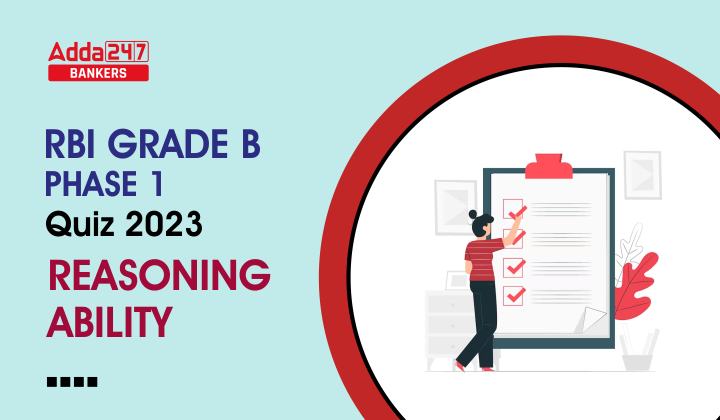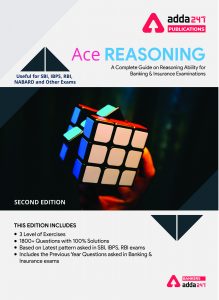Direction (1-5): Study the following information carefully and answer the given questions.
Nine boxes i.e., J, K, L, M, T, U, V, W, and X are kept one above the other in a stack. The lowermost stack is numbered 1, the stack above it is numbered 2, and so on until the topmost stack is numbered 9. All the information is not necessarily in the same order.
Three boxes are placed between box J and box X. Two boxes are placed between Box X and Box K. Box W is placed four places above Box K. Four boxes are placed between Box W and Box L. Two boxes are placed between Box L and Box M. Box U is placed adjacent to Box M. Box T is placed below Box V but not immediate below. Box V does not place at the top.
Q1. How many boxes are placed between Box U and Box J?
(a) Three
(b) One
(c) Two
(d) None
(e) More than three
Q2. Which amongst the following box is placed three places below Box L?
(a) Box T
(b) Box X
(c) Box V
(d) Box U
(e) None of these
Q3. What is the position of Box K from top?
(a) Second
(b) Third
(c) Fifth
(d) Seventh
(e) Fourth
Q4. How many boxes are placed below box J?
(a) Five
(b) Three
(c) One
(d) Six
(e) Two
Q5. Which amongst the following box is placed on topmost position?
(a) U
(b) W
(c) J
(d) M
(e) None of these
Direction (6-10): Study the following series carefully and answer the questions accordingly.
548 654 965 694 865
Q6. If all the digits in each number are arranged in descending order within the number, then how many numbers will remain the same?
(a) Two
(b) One
(c) More than three
(d) Three
(e) None of these
Q7. If the positions of the first and the third digit of each number are interchanged then what will be the sum of all the digits of the second-lowest number thus formed?
(a) 23
(b) 19
(c) 16
(d) 21
(e) None of these
Q8. What will be the resultant if the first digit of the highest number is divided by the third digit of the second lowest number?
(a) 2.10
(b) 3.20
(c) 2.25
(d) 1.75
(e) None of these
Q9. If all the numbers are arranged in descending order from the left to the right, then which of the following will be the product of the first and the second digit of the number which is second from the left end?
(a) 64
(b) 52
(c) 56
(d) 48
(e) None of these
Q10. If one is subtracted from the first digit and two is subtracted from the third digit of each of the numbers then what will be the difference between the second digit of the highest number and third digit of the lowest number thus formed?
(a) 4
(b) 1
(c) 2
(d) 0
(e) None
Direction (11-15): In the following questions assuming the given statement to be true, find which of the following conclusion(s) is/are definitely true, and then give your answers accordingly.
Q11. Statements: Y ≤ D = C, F ≤ X < C, F = S < Q
Conclusions: I. Y < F
II. X ≥ S
(a) Only I is true
(b) Only II is true
(c) Either I or II is true
(d) Neither I nor II is true
(e) Both I and II are true
Q12. Statements: B = S ≥ N < P, K = Z < B, Q ≥ P
Conclusions: I. Z < S
II. Q > S
(a) Only I is true
(b) Only II is true
(c) Either I or II is true
(d) Neither I nor II is true
(e) Both I and II are true
Q13. Statements: K > T ≥ Q, Q = L < R, R ≤ U = H
Conclusions: I. K > L
II. Q < H
(a) Only I is true
(b) Only II is true
(c) Either I or II is true
(d) Neither I nor II is true
(e) Both I and II are true
Q14. Statements: U = C > X, B = V ≤ X, B > Y < D
Conclusions: I. C > Y
II. D ≥ X
(a) Only I is true
(b) Only II is true
(c) Either I or II is true
(d) Neither I nor II is true
(e) Both I and II are true
Q15. Statements: W < Y ≥ F < X, F = N
Conclusions: I. N ≤ Y
II. Y > X
(a) Only I is true
(b) Only II is true
(c) Either I or II is true
(d) Neither I nor II is true
(e) Both I and II are true
Solutions

S6. Ans. (d)
Sol. Series= 548 654 965 694 865
After rearrangement = 854 654 965 964 865
Therefore, option (d) is the correct answer.
S7. Ans. (b)
Sol. After interchange = 845 456 569 496 568
Second lowest number= 496; Required sum = 4 + 9 + 6 = 19
Therefore, option (b) is the answer.
S8. Ans. (c)
Sol. First digit of highest number (965) = 9; Third digit of second lowest number (654) = 4
Required resultant = 9 ÷ 4 = 2.25
Therefore, option (c) is the correct answer.
S9. Ans. (d)
Sol. After rearrangement = 965 865 694 654 548
Required product = 8 x 6 = 48
Therefore, option (d) is correct.
S10. Ans. (d)
Sol. After subtraction = 446 552 863 592 763
Required difference = 6 – 6 = 0
Therefore, option (d) is the correct answer.
S11. Ans. (b)
Sol. I. Y < F – False
II. X ≥ S – True
S12. Ans. (a)
Sol. I. Z < S – True
II. Q > S – False
S13. Ans. (e)
Sol. I. K > L – True
II. Q < H – True
S14. Ans. (a)
Sol. I. C > Y – True
II. D ≥ X – False
Q15. Ans. (a)
Sol. I. N ≤ Y – True
II. Y > X – False





 GA Capsule for SBI Clerk Mains 2025, Dow...
GA Capsule for SBI Clerk Mains 2025, Dow...
 The Hindu Review October 2022: Download ...
The Hindu Review October 2022: Download ...
 ECGC PO Cut off 2025 Out, Check Final Cu...
ECGC PO Cut off 2025 Out, Check Final Cu...




